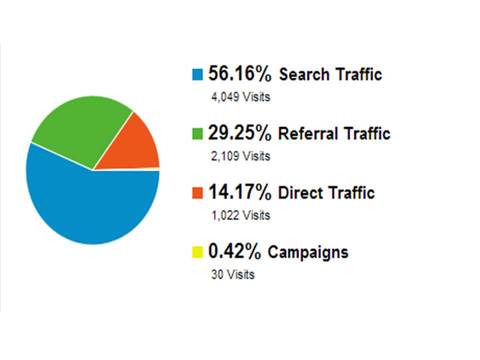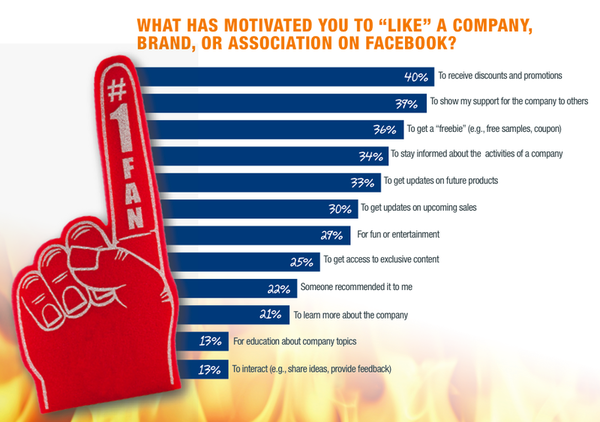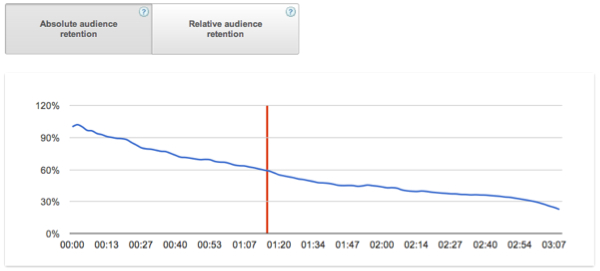“If you can’t measure it, you can’t manage it,” said Peter Drucker.
Social media measurement tools are one of the fastest growing areas of analytics and venture funding. But, among businesses that purchase them, only 34% are “happy;” 60% say they are merely “okay” and 6% are so frustrated they are ready to switch (source: KISSmetrics).
Do we need to know lots of measurements, or just manage the ones that matter?
Here are 10 social media measurements every marketer should know.
1. VISITORS FROM SOCIAL MEDIA (GOOGLE ANALYTICS): It may surprise you but, to me, Google Analytics is the most effective social media measurement tool available. Why? Because, if your social media efforts are effective, people are going to come to your brand website. Google Analytics tells you who, how, where, when and why. In the Google Analytics dashboard, “Traffic Sources” tell you, through a pie-chart like the one below, not only how people come to your website but from where – whether it’s from “Search” (organic and paid), “Referral” (social media and e-marketing) or “Direct.”

3. KEYWORDS (GOOGLE ANALYTICS): In the “Overview” section of “Traffic Sources,” there are the “Keywords” that people use who come to your website. This gives you guidance on their unmet needs and words to use in posts, tweet and blog titles so you know how to attract your audience.
4. “LIKES” AND COMPETITORS’ “LIKES” (FACEBOOK): We all want our brand to be loved “Likes” on Facebook are as close as it gets in social media and is a good metric to track. WOMMA estimates the value of a “Like” to be worth $71.84 to a brand. So it’s worth it not only to keep track of the “Likes” for your brand but also the “Likes” for your competitors. If you want to know how to increase “Likes,” here’s what Excel Target says motivates people to “Like” your brand.
5. PEOPLE TALKING ABOUT (FACEBOOK INSIGHTS): Engagement is a key reason to use social media. “People Talking About,” available through Facebook Insights, is one of the best measurements of engagement. It is the number of unique people who have either “Liked,” commented, shared or mentioned your brand on Facebook. If “Likes” and “People Talking About” are increasing, your brand is creating a positive buzz.
6. FOLLOWERS AND COMPETITORS FOLLOWERS (TWITTER): These are people who take an interest in your brand. It is worth tracking for both your brand and your competitors. Followers also are a good metric if your brand is active on Pinterest.
7. RE-TWEETS (TWITTER): Like “People Talking About” measures engagement and involvement on Facebook, Re-Tweets (RT) work similarly on Twitter. They are the metric that measure the quality, rather than the quantity, of your Tweets. If your brand in active on Pinterest, Re-pins are an equivalent measure.
8. COMMENTS AND PINGBACKS (BLOG): If your brand has a blog, the number of comments and “pingbacks” should be tracked and measured. The latter are “links” from other blogs who have passed along your content to their readers. Imitation is the sincerest form of flattery.
9. VIEWS (YOUTUBE): If your brand is on YouTube, views are valuable currency. Views are turbo-chargers to your search rank, especially since YouTube is the #2 search engine. If you ever want your social media activity to go viral, case studies indicate it is more likely to happen on YouTube than any other social network.
10. AUDIENCE RETENTION – “DROP OFF” (YOUTUBE ANALYTICS): YouTube analytics are some of the most sophisticated software on the internet. Many that’s because YouTube is owned by Google. One that is particularly valuable is “drop off” or when people stop watching your video. If you put video on YouTube and aren’t paying attention to this metric, the only one that’s suffers is your brand.
Other social media metrics like your Klout Score, Kred Score, Topsy, Booshaka (for Facebook Advocates), Technorati (for blog “Authority Score”) and Twitter Search (for geo-targeting) could certainly have value for your brand depending on objectives and business goals.
But these are my Top-10 because they tell you: 1) why social media is important to your business, 2) what social networks matter most and 3) how your brand is doing at driving engagement.
Do you agree? What else would you include?








Thanks for these metrics. One major problem with the metrics that you propose is that they are all generic.
The objective of marketing is to me to attract “the right” people and turn them into valuable customers.
For example, if I sell luxury cosmetics to women, visits, like, follows from kids in Cairo (most of them being spammer) have no value for me and can actually be detrimental to the overall value of my marketing program.
On the other end, if I get liked, followed by affluent women or even better by influencers targeting these women, it is a very different story.
I would go for less metrics but targeted ones.
Best
Thanks for your comment, Dominique. I agree the role of marketing is help attract the right people who will be most valuable customers and less metric, more targeted, are always better. In my experiences, I’ve found many people don’t know the right people until they understand who they are attracting, in general, first. But I think a strong focus on the right people is always an asset. Thanks for the input. Rob
[…] draw traffic from more search queries. These keywords can also be found in the Traffic Sources of Google Analytics. If you are publishing new content but the number of keywords drawing traffic is not increasing […]
[…] draw traffic from more search queries. These keywords can also be found in the Traffic Sources of Google Analytics. If you are publishing new content but the number of keywords drawing traffic is not increasing […]